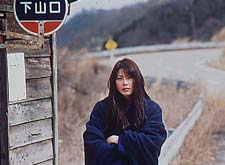 Maborosi
(Japan; 1995)
Maborosi
(Japan; 1995)  Maborosi
(Japan; 1995)
Maborosi
(Japan; 1995) Starring Makiko Esumi, Tadanobu Asano, Takashi Naito, Akira Emoto, Hiromi
Ichida, Midori Kiuchi, Mutsuko Sakura.
Written by Teru Miyamoto.
Directed by Hirokazu Kore-eda.
Grade: A-
Review by Jeff Vorndam.
Thrilling. Grippping. These are not words I would use to describe Hirokazu Kore-eda's first feature film Maborosi. Instead I would use these words: Illuminating. Subdued. Ambient. Symmetry. Ruminating. I was captivated by how Kore-eda used his visual style to express the story. There's not much dialogue, and there is little in the way of drama. Instead, the movie's themes work their way out subtly and gradually to an immensely satisfying conclusion (that paradoxically explains very little.)
Maborosi begins with a short prologue about a girl who cannot prevent
her grandmother from leaving back to her hometown to die. As if being called
by a greater power, the old woman leaves and never returns. We learn that the
little girl is our protoganist, Yumiko (Makiko Esumi) and that she is now 20
year old and happily married to Ikuo (Tadanobu Asano). They have a baby, and
in scenes of quiet grace it is conveyed that she is happy and in love. One day
her husband is walking along the railroad tracks and is run over and killed
by a train. The death is assumed to be a suicide. Yumiko is beside herself with
grief, but we aren't given the typical cliches of emotive anguish and commiseration
with her friends. Instead, as he does throughout the film, Kore-eda lets us
know how Yumiko is feeling on the inside through his carefully constructed mis-en-scene.
In lieu of tears from Yumiko, we see her riding in a police car on a rainy day
with droplets of rain running down the window. 
Five years later, Yumiko goes into an arranged marraige with Tamio (Takashi Naito), a widower with a daughter. At first her isolation is palpable. The camera always regards her from a distance, or she is shown in shadow while the rest of the frame is blessed with light. Eventually, as her son finds Tamio's daughter a good playmate, so does Yumiko seem to grow into her role as Tamio's wife. For a period the film becomes sunnier in tone, and we think maybe Yumiko has gotten over her mourning period.
A return visit home however stokes new heartache in Yumiko when she learns that Ikuo had stopped at the bar on his way home that fateful night in a cheerful state. What drove him to suicide then? Her wounds opened anew, Yumiko goes to the sea where she witnesses a funeral procession. I won't spoil the ending, but one of the most wonderful long shots I've ever seen leads to the climax. The funeral procession marches along the shore framed above by the sky, in the background by the sea, and below by the earth. The shot is almost five minutes long and taken from a great distance. It speaks more in its picture than a hundred paragraphs of mine could explain in words.
Kore-eda's technique may seem like anti-technique at first. The camera almost never moves. The editing is spare. A shot begins with a setting and then we wait for someone to enter it. They leave and we are left to contemplate the setting again. This gives a timelessness to the scenes and a gravity to the picture. The film requires patience from its audience to stay with Yumiko as she works out her feelings about the death of her husband. In a way, the film may be slow-paced because it is needed to show that these wounds take time to heal. Another cinematic element Kore-eda employs is that his characters are shot at a distance and at eye-level. We see them as part of their surroundings, and their environment appears to comment on them from time to time. (As in his latest film After Life, there is lovely scene where it begins to snow.) To me, the distance emphasizes her loneliness. We as viewers are sympathetic but she must find peace of mind on her own.
Maborosi means "illusory light" in Japanese. It's an aura that glows over the sea and has called many a person to their deaths. It is unexplainable, but accepted. In the end, that is how we all must view death.
Review © August 1999 by AboutFilm.Com and the author.
Send us a comment on this review. We'll post a link to the best comments!